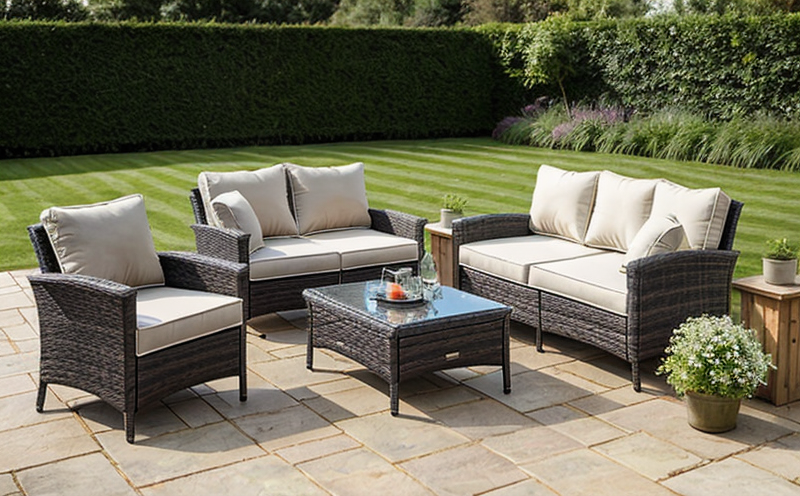BS EN 12720 Resistance to Cold Liquids on Outdoor Furniture Surfaces Testing
The BS EN 12720 standard is critical for manufacturers of outdoor and garden furniture, ensuring that products are durable and safe under various environmental conditions. This test specifically evaluates the resistance of outdoor furniture surfaces to cold liquids such as water, oils, or other similar substances. The purpose is to ensure that these materials do not degrade, discolor, or become slippery when exposed to common cold liquids.
The standard applies primarily to garden and outdoor furniture made from various materials including but not limited to wood, metal, plastic, and composite materials. Compliance with this test ensures the aesthetic appeal, functionality, and safety of the product over time in a wide range of climates. This is especially important for products that will be exposed to prolonged periods of cold weather during which these liquids can accumulate on surfaces.
The testing procedure involves placing a specified volume of cold liquid onto the surface of the specimen and then observing and measuring its behavior after exposure to specific temperature conditions. The standard defines clear criteria for acceptable performance, including no visible signs of discoloration or swelling within a certain period post-exposure. This helps manufacturers meet regulatory requirements and build consumer trust.
The process is designed to simulate real-world scenarios where outdoor furniture may encounter cold liquids. For example, during rainy weather in winter months, water can accumulate on the surfaces of garden furniture. The standard ensures that this does not lead to deterioration or safety hazards for users. By adhering to these tests and meeting the specified criteria, manufacturers can ensure their products are robust enough to withstand such conditions.
Compliance with BS EN 12720 is essential for businesses operating in sectors requiring high-quality outdoor furniture. It ensures that the product meets both functional and safety standards, which is crucial not only in Europe but also globally as many countries have adopted this standard or similar ones to ensure quality.
In summary, BS EN 12720 testing is a vital step for any manufacturer of outdoor furniture aiming to produce reliable products that can withstand harsh environmental conditions. It helps maintain the integrity and safety of the product throughout its lifecycle.
Benefits
Compliance with BS EN 12720 brings several key benefits to manufacturers:
- Enhanced Product Quality: Ensures that the product meets high standards of durability and safety.
- Regulatory Compliance: Helps businesses avoid potential legal issues by adhering to international regulations.
- Consumer Trust: Builds confidence among customers who are assured of a safe and reliable product.
- Competitive Advantage: Differentiates the brand in the market as a leader in quality assurance.
Industry Applications
The application of BS EN 12720 is particularly relevant for manufacturers and suppliers of outdoor furniture. This includes:
- Garden Furniture: Chairs, tables, benches.
- Folding Furniture: Products that can be easily moved or stored outdoors.
- Children's Play Equipment: Ensuring the safety of children in cold weather conditions.
- Restaurant and Cafe Furniture: Tables, chairs, and other seating for outdoor dining areas.
Use Cases and Application Examples
| Case Study | Description |
|---|---|
| Garden Furniture Manufacturer X | This case study involves a manufacturer of garden furniture who wanted to ensure their products could withstand cold weather conditions. After conducting the BS EN 12720 test, it was found that certain finishes were not resistant enough to cold liquids. This led to adjustments in the manufacturing process and a final product that met all standards. |
| Outdoor Cafe Furniture Supplier Y | This example focuses on an outdoor cafe furniture supplier who uses composite materials for their products. The test highlighted the need for additional sealing to prevent moisture from causing long-term damage, ensuring durability and safety during winter months. |





